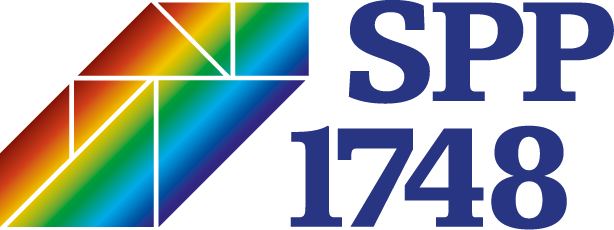Research Group of Prof. Dr. Daniel Peterseim
Mr. Peterseim is now at University of Augsburg. This page is no longer maintained.
Contact Information
Teaching
Winter semester 2016/17
-
Practical Lab Numerical Simulation Numerical Simulation of Partial Differential Equations
Summer semester 2016
See teaching activities of the whole group.
Completed Research Projects

Adaptive isogeometric modeling of propagating strong discontinuities in heterogeneous materials
Multi-material lightweight designs and smart devices with characteristic microscopic material structures are the key features for the development of innovative products. In this context, an adaptive isogeometric framework for the modeling and simulation of crack propagation in heterogeneous materials is to be developed, implemented, and mathematically analyzed in this project. The mechanical modeling of interface failure will be based on increasing knot multiplicities driven by cohesive zone models for crack propagation along material interfaces. In addition, a phase-field model will account for propagating cracks in the bulk material including interaction phenomena such as crack branching and coalescence. The spline-based discretization used offers higher efficiency compared to Lagrangian polynomials, control of regularity, accurate approximation of strong gradients in the phase-field order parameter, as well as the possibility to discretize higher-order phase-field equations. Local mesh adaptivity required for the resolution of material interfaces and the phase-field variables will be provided by T-splines as well as hierarchical spline approximations. In addition to the physical modeling, open mathematical problems include a practicable characterization of T-meshes suitable for IGA in 3D and clear understanding of the role of increased regularity in the approximation.
See all projects of the group.
Publications
-
-
-
-
-
-
-
-
Multiscale Petrov-Galerkin method for high-frequency heterogeneous Helmholtz equations.
D. Brown, D. Gallistl, and D. Peterseim.
In M. Griebel and M. A. Schweitzer, editors, Meshfree Methods for Partial Differential Equations VII, Lecture Notes in Computational Science and Engineering.
2016.
BibTeX
PDF
arXiv
-
-
-
-
-
An analysis of a class of variational multiscale methods based on subspace decomposition.
R. Kornhuber, D. Peterseim, and H. Yserentant.
Submitted for publication, November 2016.
BibTeX
-
-
-
-
Variational multiscale stabilization and the exponential decay of fine-scale correctors.
D. Peterseim.
In G. R. Barrenechea, F. Brezzi, A. Cangiani, and E. H. Georgoulis, editors, Building Bridges: Connections and Challenges in Modern Approaches to Numerical Partial Differential Equations, volume 114 of Lecture Notes in Computational Science and Engineering.
Springer, may 2016.
BibTeX
PDF
arXiv
-
-
-
-
-
-
-
Multiscale Petrov-Galerkin finite element method for high frequency acoustic scattering.
D. Gallistl and D. Peterseim.
Oberwolfach Reports, 12(3):2580–2581, 2015.
BibTeX
-
Multiscale partition of unity.
P. Henning, P. Morgenstern, and D. Peterseim.
In M. Griebel and M. A. Schweitzer, editors, Meshfree Methods for Partial Differential Equations VII, volume 100 of Lecture Notes in Computational Science and Engineering, pages 185–204.
Springer International Publishing, 2015.
BibTeX
PDF
DOI
-
-
-
-
-
-
-
-
-
-
-
-
-
-
-
-
-
-
-
-
-
-
-
-
-
-
-
-
-
-
The Composite Mini Element: A mixed FEM for the Stokes equations on complicated domains.
D. Peterseim.
PhD thesis, Universität Zürich, 2007.
BibTeX
-
-
Numerische Analyse parameterabhängiger periodischer Orbits nichtlinearer dynamischer Systeme mittels Mehrzielmethode und effizienter Fortsetzungstechniken.
D. Peterseim.
Master's thesis, IfMath, TU Ilmenau, 2004.
BibTeX
-
Multiscale Petrov-Galerkin method for high-frequency heterogeneous Helmholtz equations. D. Brown, D. Gallistl, and D. Peterseim. In M. Griebel and M. A. Schweitzer, editors, Meshfree Methods for Partial Differential Equations VII, Lecture Notes in Computational Science and Engineering. 2016. BibTeX PDF arXiv
-
An analysis of a class of variational multiscale methods based on subspace decomposition. R. Kornhuber, D. Peterseim, and H. Yserentant. Submitted for publication, November 2016. BibTeX
-
Variational multiscale stabilization and the exponential decay of fine-scale correctors. D. Peterseim. In G. R. Barrenechea, F. Brezzi, A. Cangiani, and E. H. Georgoulis, editors, Building Bridges: Connections and Challenges in Modern Approaches to Numerical Partial Differential Equations, volume 114 of Lecture Notes in Computational Science and Engineering. Springer, may 2016. BibTeX PDF arXiv
-
Multiscale Petrov-Galerkin finite element method for high frequency acoustic scattering. D. Gallistl and D. Peterseim. Oberwolfach Reports, 12(3):2580–2581, 2015. BibTeX
-
Multiscale partition of unity. P. Henning, P. Morgenstern, and D. Peterseim. In M. Griebel and M. A. Schweitzer, editors, Meshfree Methods for Partial Differential Equations VII, volume 100 of Lecture Notes in Computational Science and Engineering, pages 185–204. Springer International Publishing, 2015. BibTeX PDF DOI
-
The Composite Mini Element: A mixed FEM for the Stokes equations on complicated domains. D. Peterseim. PhD thesis, Universität Zürich, 2007. BibTeX
-
Numerische Analyse parameterabhängiger periodischer Orbits nichtlinearer dynamischer Systeme mittels Mehrzielmethode und effizienter Fortsetzungstechniken. D. Peterseim. Master's thesis, IfMath, TU Ilmenau, 2004. BibTeX